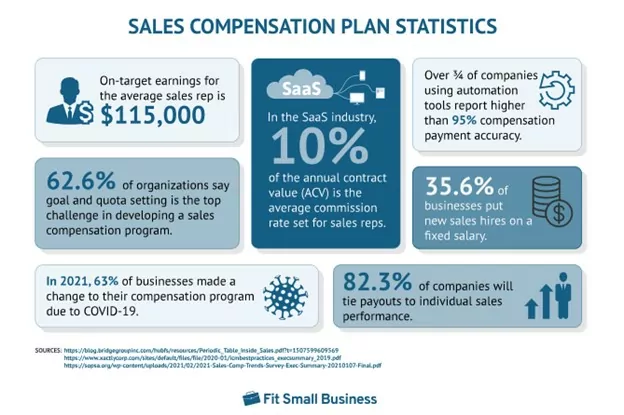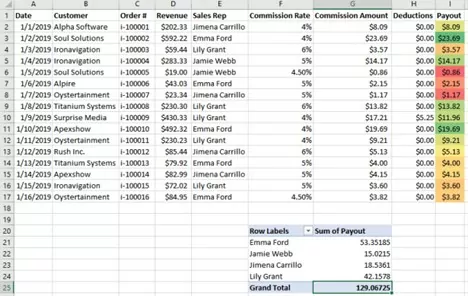As much as your sales reps might enjoy the thrill of the hunt, they’re just like everyone else: They require clear sales compensation plans, security levels, and structures to organize their lives around.
Salespeople also desire rewards for their good performance and might look elsewhere if they don’t feel appreciated enough at their current company. 43% of sales reps say they would change companies for a 10% salary increase.
So how can you ensure you’re attracting and retaining the best sales talent available? By structuring a great sales compensation plan that perfectly balances performance incentives with clear objectives and milestones.
Let’s talk about how to structure a sales compensation plan. Then we’ll give you some examples to inspire a plan of your own.
Key Takeaways:
- Your sales compensation plan is your first opportunity to attract and motivate the best sales reps available.
- Getting your incentive structure right is critical to your long-term success.
- There are many tried-and-true plans you can implement to get started immediately and see what works best for your company.
What is a Sales Compensation Plan?
A sales compensation plan is a company’s method for ensuring positive performance and clear direction and providing incentives to a sales team. It usually consists of a base salary as well as incentives for closed sales and other performance metrics.
Source: Fit Small Business
Important Aspects of a Good Sales Compensation Plan
A proper sales compensation plan not only provides the much-needed structure for your salespeople but also encourages good behavior and techniques so you can maximize performance.
Here are three basic factors to organize your sales compensation plan around:
Enablement and Structure
These go together because the amount of support or enablement you provide your sales team will directly affect what you can expect them to achieve. Knowing this is the first step towards designing a good compensation structure.
Questions like these will help you determine the best structure for your sales compensation plan:
- What are your company’s short and long-term goals?
- What sales strategies will help you reach those goals?
- What levels of autonomy and enablement will your reps receive?
- What does a competitive compensation plan in your industry look like?
- Are there any industry- or business-specific metrics you’d like to incentivize?
Clarity
Clarity is extremely important in a sales compensation plan because it directly affects how your sales reps are motivated.
If reps don’t understand the compensation plan you’ve laid out or what support they’ll be working with, they may not properly orient their efforts according to what you’ve decided is best for the company.
Focus on creating a plan that is easy to grasp and follow so that reps always feel they’ve been properly rewarded for their performance.
Incentive
The frank truth is that sales reps are usually going to target the deals that are best for them. This is not a bad thing. When you acknowledge this fact, you realize it’s actually the main lever you can pull to increase your revenue and keep the best sales reps around for longer.
The key is to make sure that what’s best for your sales reps is also best for your company. That alignment is what keeps sales reps and management synchronized and happy.
For more on structuring and implementing sales plans, see this video by Sandler Worldwide:
Sales Compensation Plan Examples
Here are three examples of sales compensation plans you can start using immediately.
Base Salary + Commission and/or Bonus
Source: Sales Cookie
In this type of plan, a rep will receive a base salary untied to performance, as well as a commission that is structured around your budget and the difficulty of each sale. You could also use a flatter bonus structure that rewards employees once they’ve hit their quotas.
This is the classic structure of a sales compensation plan. It works well for most industries because it balances selling and non-selling tasks as well as making it easy to predict and control costs.
From the rep’s point of view, this type of plan provides a steady salary they can count on while also giving them clear goals and milestones they can strive for to increase their income – a win-win.
Commission Only
This is a riskier plan from both the business’s and the rep’s perspective, but it comes with a few unique benefits.
From the company’s point of view, this type of plan involves minimal risk from underperforming reps since their compensation is directly tied to revenue. However, a high-performing rep may end up taking a bigger slice of revenue than you can afford in the long run.
Reps lose the stability of a guaranteed salary but gain an increased incentive to work hard and earn as much money as they can through diligence and effort.
Draw Against Commission
You could decide to pay reps their commissions in advance as a motivating tool. This is called a draw against commission plan.
This works by motivating reps to earn money they’ve already received. If they fail to earn the commission, you can decide whether to “claw back” that money from their next check, or not.
Letting newer reps keep their draws is a good idea since it gives them a cushion period during which they’ll be able to improve their skills and eventually earn their commission.
Help Keep Your Sales Team on Track with MXTR Automation
The right enablement may be what you need to motivate and keep your best sales talent for longer.
A representative’s performance is not entirely up to them to control. Marketing’s ability to generate and hand off leads can directly contribute to sales success. Keeping these two departments aligned is one of the reasons we created our platform.
MXTR’s marketing automation platform is the best tool available for tracking and managing leads. We specialize in helping businesses track leads across all their locations to maximize your sales team’s chances of success.
To learn more about how MXTR’s automation platform can help your sales teams achieve goals, schedule a demo.








